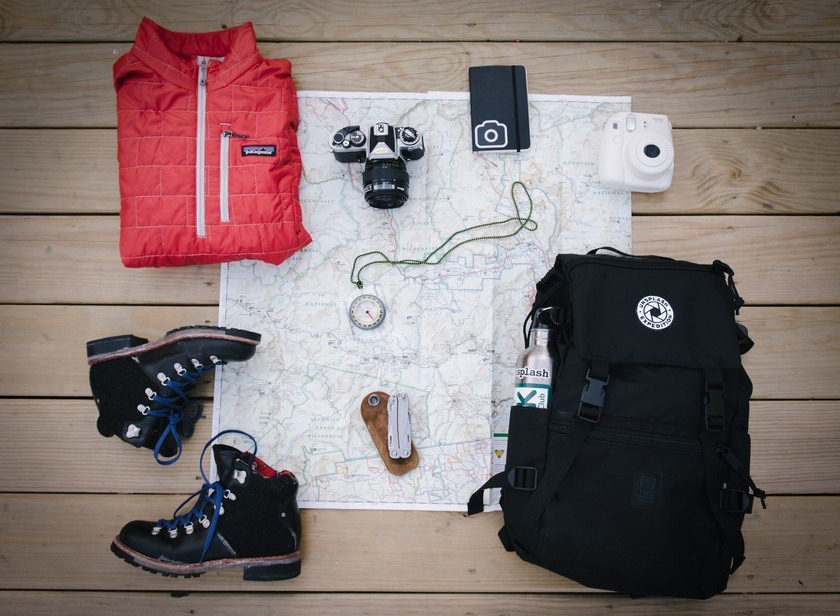International travel as a vegan does not have to be complicated! Instead, it can be simple, and enjoyable as long as you follow the insightful tips suggested below.
Pack Vegan!
First of all, before you even step foot in another country you can make some choices that will ensure you keep to your values while travelling if you make sure your luggage and the items it contains are vegan.
Your luggage
This means choosing robust, and roomy bags that are made from vegan materials. The good news is there is now a wide range of bags, backpacks, suitcases, and holdalls that are all made from attractive and hardy materials, that contain no animal products such as leather. You can even get vegan luggage tags to match your baggage!
Your clothing, footwear, and equipment
In addition to having vegan luggage, the individual items that you pack must be vegan as well. This is where it pays to carefully think about the things that you are likely to use the most and find quality items that will last for as long as possible. Otherwise, you can end up in a remote location with no choice but to replace an item with a product that is distinctly not vegan! For example, if you are travelling the chances are you’ll be doing a lot of walking. That means it pays to invest in pairs of comfortable, rugged shoes made from all-vegan materials. For a hot climate trainers, and sandals are the best combo, while for a colder one trainers and boots are a better choice.
When it comes to clothing, the logic is the same: avoid animal products and go plant-based as much as possible. Since polyester causes quite a lot of harm to the environment due to pollution via microplastics (and generally being a by-product of the fossil fuel industry) we recommend any of these fully plant-based clothing solutions: cotton, hemp, linen and ramie. Above is a photo of me in one of my favourite cotton-hemp jumpers - they're quite nice and warm :)
Lastly, you’ll want to make sure that any items and equipment you need for your adventures and activities you’ll do while travelling are vegan too. Now, most of the larger items will be supplied on-site. However, you can click here to get some suggestions on smaller ones like the waterproof bags. Such bags are perfect for kayaking and other water-sports as they are made from vinyl or nylon and will keep their contents safe and dry.
Lastly, you’ll want to make sure that any items and equipment you need for your adventures and activities you’ll do while travelling are vegan too. Now, most of the larger items will be supplied on-site. However, you can click here to get some suggestions on smaller ones like the waterproof bags. Such bags are perfect for kayaking and other water-sports as they are made from vinyl or nylon and will keep their contents safe and dry.
Eating Vegan While Travelling
Being vegan in a foreign country can be a real mixed bag when it comes to food. Sometimes you will be spoiled by all the amazing culinary experiences that are on offer like a smorgasbord before you. Other times, you’ll find yourself explaining over and over again that neither chicken nor cheese are vegan, and that yes you would like something more than a dry iceberg salad to eat! Happily, there are some things you can do to maximize the number of delicious vegan-friendly foods you get access to while on your travels. The first of these things is to make sure you know at least a few phrases that relate to food and eating out in the local language. For example:
“I am vegan.
What dishes on your menu are vegan?
No meat, fish or dairy in my meal, please.
I don’t eat meat, fish, dairy.
Please can you replace the meat/fish/dairy with nuts/pulses/seeds/tofu, etc.?”
What dishes on your menu are vegan?
No meat, fish or dairy in my meal, please.
I don’t eat meat, fish, dairy.
Please can you replace the meat/fish/dairy with nuts/pulses/seeds/tofu, etc.?”
Often the best way to do this is to use a translation app and show your screen with the translation on to your server. Additionally, you can play the audio, or get a local acquaintance to record an audio for you. And while we are on the subject of locals, they are invariably the very best people to give you the low-down on the best places to secure yummy vegan food. Be sure to ask the folks running/working at your accommodation for their recommendations.
Lastly, do remember that you have vast resources for finding the best vegan food all over the world at your fingertips via the Internet. Indeed, there are many wonderful sources of knowledge that you can tap including the iconic and very helpful Happy Cow app. There are also plenty of social media content creators focusing on vegan food right now, and you can find the latest and most trending recommendations for places to eat from vegan cafes to vegan-friendly street food by searching your location along with #vegan.
Choose activities that do not harm wildlife!
Last of all, it's vital that when travelling as a vegan you choose activities that support the local wildlife rather than harm it. For example, most vegans see snorkelling and other water-sports as vegan as long as you do all you can to minimize any harm which means using sunblock that will not kill the coral, or choosing dive companies that actively help preserve the local ecosystem. On the other hand, many ‘wildlife sanctuaries’ including aviaries, dolphinariums, and elephant sanctuaries are mostly not in line with the vegan way of life. This is because the animals there are often required to perform or interact with visitors in a way other than what would be usual to them in their natural habitats. We recommend visiting and donating to farmed animal sanctuaries instead.
Then there are activities where it may not be clear if they harm the wildlife or not at first glance. An example of this is perhaps a bungee jump that has been set up in an area where it disrupts the local ecosystem, and causes higher footfall as well as wear and tear to an area that would otherwise not be visited much. Of course, as is so often the case as a vegan, such a conundrum is left to our own internal sense of ethics, and the information we can glean from the locals, the activity organizer, and online. Although a good rule of thumb here is, ‘if in doubt, don’t’ and wait until you can find a similar activity that you know is more friendly to the local ecosystem.
What about you, how do you travel as a vegan? Feel free to share any tips & advice below!










